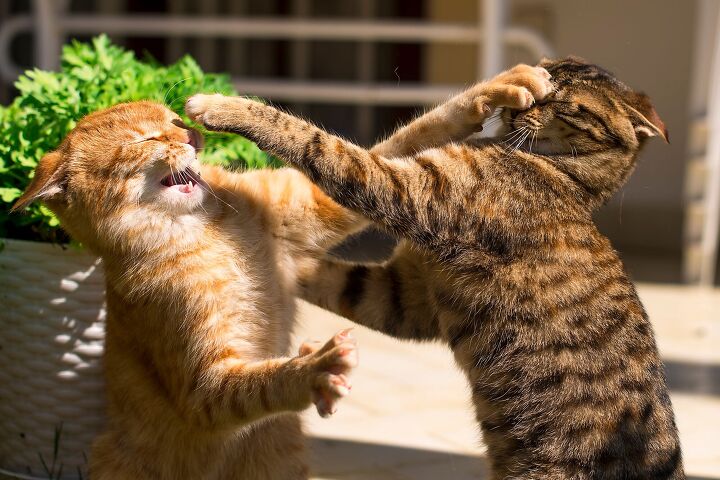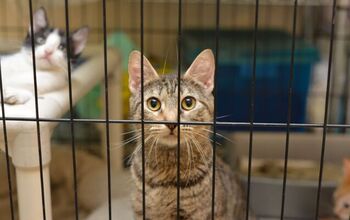How to Help Your Cats Get Along

Sharing your home with more than one cat can be a beautiful thing, as long as everyone gets along. When you have kitties who can’t stand being around each other or, worse yet, get into terrible fights all the time, daily life can be frustrating for them and for you.
Cats can be quite rough when they play together, so it’s necessary to distinguish between playful attacks and truly aggressive behavior that can cause stress and harm. If you know for sure there’s conflict that needs to be resolved, it’s important to learn how to get cats to stop fighting.
With the right strategy, your pets can start to get along and you can have a peaceful multi-cat household. Here are some recommendations you can try, bearing in mind that consistency and patience are key when working with kitties.
First, Figure Out the Reason for the Conflict
To choose the ideal solution for your cats, carefully consider what the cause of the fighting might be. Keep each pet’s temperament in mind, as this can help you resolve conflict effectively while addressing everyone’s preferences and needs.
Are there certain situations that lead to fights? Is something in their environment causing anxiety or stress? Does the fighting happen when one cat is in a bad mood and wants to take it out on another kitty?
You might find that your cats fight when they’re eating near one another, when they need more space away from each other, or even during playtime with their toys. In these cases, it’s a matter of territory and access to the basic things they want, from a cozy napping spot to a place where they can eat and drink without being bothered.
Other things to keep in mind: if there’s activity outside, such as birds at the feeder or stray kitties in your backyard, your cats might get frustrated and let it out on each other through aggressive behavior. Or, if you take one cat to the vet and bring her home, her scent may be so different that your other cat doesn’t recognize her and reacts harshly.
Try Different Remedies to Help Your Cats Get Along
Once you begin to understand the reason why your kitties are acting up, things will become clearer. You’ll be able to remove the triggers of conflict, or at least reduce your cats’ exposure to them, and you’ll select a remedy that is most likely to work at making them feel at ease.
Note: Never punish cats for their behavior. If you see them fighting, you might clap your hands to distract them. And if you think that a fight is about to start, distracting your cats with toys or treats might stop them.
Provide Space and Easy Access to Resources
Making sure each cat has enough space is imperative, especially if they fight when they’re in each other’s way. This can be difficult to achieve if you live in a small house or apartment, but don’t worry because there are clever and creative ways to overcome this challenge.
Give your cats plenty of options in terms of where they can go when they want to be alone. They should be able to claim a space as their own so they can feel safe, secure, and calm (e.g., hammocks, covered beds, tents, sofas).
To provide your pets with more space, hiding places, and areas for relaxing and napping, you can add more cat trees and cat condos throughout your home. Providing vertical space, such as in the form of window perches and wall perches, is also a great idea, especially if you don’t have a lot of floor space.
When it comes to resources, make sure each cat has her own food and water bowls, and if your cats fight when they’re eating near one another, give each kitty her own space to eat in. That way, your pets won’t feel crowded and you won’t have to worry about one cat stealing food from another one’s bowl. Also, provide multiple scratching posts and toys in various spots throughout your house so your cats won’t have to fight over them.
Set up more than one litter box, too. Experts recommend having one box for each cat, along with an extra one. For example, if you have three cats, having four litter boxes spaced apart in different areas is a good idea. This can help ensure all of your frisky felines will have easy access to a clean box.
Use Calming Feline Pheromones
Feline pheromones are only detectable by your cats, so you won’t be able to smell them. They’re available in the form of sprays, diffusers, and collars. Put simply, they work by helping your kitties feel calmer, happier, and less stressed.
When shopping for these products, stick with high-quality options from trusted brands. Avoid products that contain potentially harmful essential oils, and go with those that contain synthetic feline pheromones that mimic the pheromones your cats naturally produce.
A good example that’s worth checking out is the FELIWAY Multicat Diffuser Kit, which can help reduce negative behaviors like fighting, chasing, and blocking. Plug it in to release pheromones into the environment. It’s designed to last 30 days, and you can purchase refills.
Give Each Cat Enough Attention
If one kitty sees that another cat is hogging all of your attention, she might get annoyed and lash out. So, make sure each pet gets enough of your affection, even if you have to separate your cats in different rooms for a short while.
Play with each cat to help her release energy in a positive, rather than aggressive, way. Also, snuggle with her, brush her fur, and give her puzzle toys for mental stimulation.
When everyone is in the same room and getting along, give them treats and praise so you can show them that it’s better when they’re peaceful.
Reintroduce Your Cats
There are specific steps you can follow when introducing cats to one another. Basically, the process involves keeping them separated in different rooms and letting them gradually get used to each other’s scent before letting them interact face-to-face.
Whether your kitties have been fighting from the moment they met or their negative attitude developed more recently, it might be necessary to reintroduce them, especially if the conflicts are so severe that they’re hurting each other.
Ask Your Veterinarian or a Cat Behaviorist for Help
If you try multiple tactics to encourage your kitties to get along but nothing seems to work, a feline behaviorist might be able to pinpoint the cause and address it with the appropriate solution. Also, some cats might behave aggressively if they’re sick or in pain, so talk to a veterinarian to figure out if the cause is a health problem that requires treatment.

Lisa Selvaggio is a freelance writer and editor, and our resident cats-pert, with certifications in pet nutrition and pet first aid. She enjoys producing content that helps people understand animals better so they can give their pets a safe and happy home.
More by Lisa Selvaggio
























